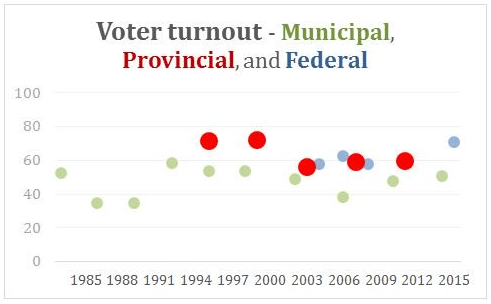Winnipeg voter turnout trending up
On April 19th, Winnipeggers head to the polls for the third time in two years. What can Peg tell us about trends in Voter Turnout in our Municipal, Federal, and Provincial elections?
On April 19th, Winnipeggers head to the polls for the third time in two years. What can Peg tell us about trends in Voter Turnout in our Municipal, Federal, and Provincial elections?
Municipal Voter Turnout (green dots)
Voter turnout has increased significantly over the past two elections. Turnout was 38.2% in 2006, 47.1% in 2010, and 50.2% in 2014. The highest turnout in the past twenty years was in 1992, at 58.4%.
Provincial Voter Turnout (red dots)
Provincial voter turnout dropped from a high of 71.6% in 1999 to 59.3% in 2011, however, turnout has increased over the last two elections.
*This data represents voter turnout in Winnipeg ridings only
Federal Voter Turnout (blue dots)
The 2015 federal election saw the highest voter turnout in ten years. Turnout climbed from a low of 57.6% in 2008 to 69.4% in 2015.
More facts available at: http://www.mypeg.ca/explorer/WellBeing/Governance/VoterTurnout/

Why is this important?
- Elections are the most fundamental processes of democratic engagement, and high turnouts are generally considered to be positive - voter turnouts are an indicator of the overall health of the democratic system.
- Voter turnout varies across the population, with some groups better represented at the polls than others. Age, education, and income are three major factors that influence voter turnout.
Peg data reflects only registered voters, not those eligible to vote.
Source of the data:
- Voter turnout data for all of Canada's previous federal elections can be found at: http://www.elections.ca/content.aspx?section=ele&dir=turn&document=index&lang=e
- Voter turnout data for all of Manitoba's previous provincial elections can be found at: http://www.electionsmanitoba.ca/downloads/HistoricalSummary.pdf.
- Voter turnout data for Winnipeg's previous municipal elections can be found at: http://winnipeg.ca/clerks/election/election2014/pdfs/officialresults.pdf
Media inquiries:
For interviews on Peg, the data, or to be connected with organizations making a difference in the community, please contact:
Sumeep Bath, Media and Communications Officer
International Institute for Sustainable Development (IISD)
(204) 958-7740 | sbath@iisd.ca
About us:
Peg (mypeg.ca) is a community indicator system that measures the health of our community year over year – in ways that count. Peg is led by two partnering organizations – the International Institute of Sustainable Development (IISD) and United Way of Winnipeg (UW).
Regularly, the team at Peg releases data and facts that help us understand our city better. This is one of those regular reports. Others can be found at http://www.mypeg.ca/blog.
Peg is the starting place for Winnipeg citizens, educators, policy makers, and many others to learn more about our city so we can lead change to create a better city for our children and their children. At Peg we can all learn how our lives, our neighbourhood and our city is changing – for the good and the bad. Learn more at www.mypeg.ca.
About IISD
The International Institute for Sustainable Development (IISD) is an award-winning independent think tank working to accelerate solutions for a stable climate, sustainable resource management, and fair economies. Our work inspires better decisions and sparks meaningful action to help people and the planet thrive. We shine a light on what can be achieved when governments, businesses, non-profits, and communities come together. IISD’s staff of more than 250 experts come from across the globe and from many disciplines. With offices in Winnipeg, Geneva, Ottawa, and Toronto, our work affects lives in nearly 100 countries.
You might also be interested in
Human Capital in Ethiopia, Indonesia, and Trinidad and Tobago
Human capital is the major component of comprehensive wealth in most countries, and how it is managed is key to long-term prosperity.
Financial Capital in Ethiopia, Indonesia, and Trinidad and Tobago
Like other assets of the comprehensive wealth portfolio, financial capital can be used to support a country's long-term prosperity.
Natural Capital in Ethiopia, Indonesia, and Trinidad and Tobago
Natural resources play fundamental roles in our well-being and lives, as well as sustaining a country's comprehensive wealth.
Produced Capital in Ethiopia, Indonesia, and Trinidad and Tobago
Part of comprehensive wealth, produced capital is the value of the stock of all human-made assets used to produce goods and services in the economy.